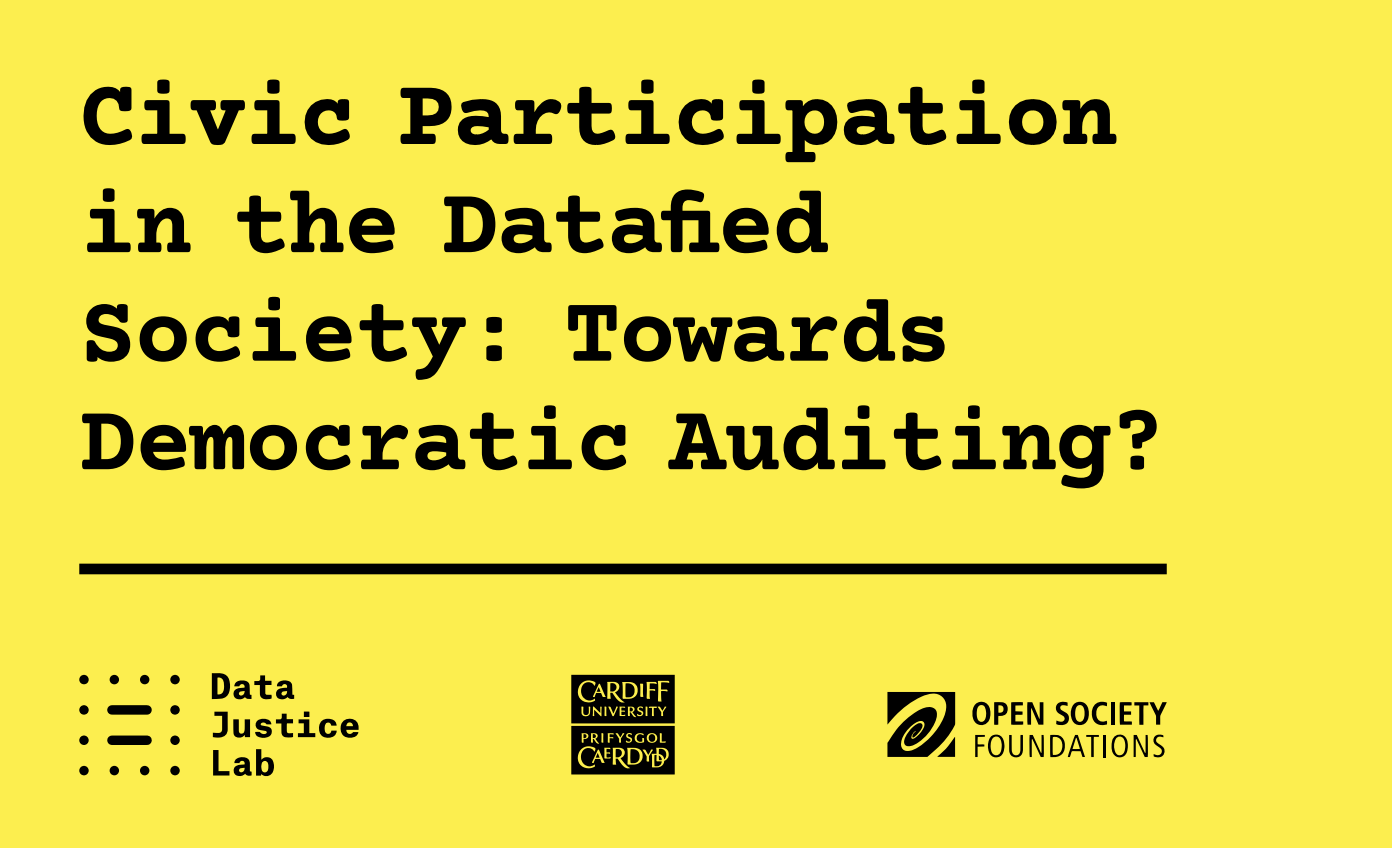Tim and Jonathan attended a launch event for the Data Justice Lab report, “Civic Participation in the Datafied Society - Towards Democratic Auditing?” and the associated website Datafied Society
Reporting
The event outlined findings from a three-year, OSF funded project, drawing on desk research, 64 interviews, participant observation, fact-finding workshops and conference discussions, to explore the avenues that do, or could, exist, for people to participate in decisions about the use of predictive analytics by public institutions?
The findings of the project underscored the demand for greater public engagement in decisions about the development and deployment of data-driven systems, and documented a number of the current gaps between visions for, and realities of, participatory governance of technology.
To pick out just a few elements of note:
-
In exploring the institutional context and dynamics of public institutions using predictive analytics, researchers note that whilst there may be internal opportunities for technical approaches to be subjected to critique, the public authorities studied had have only made limited attempts to open space for public engagement. The team explained: “Meaningful public engagement means not just telling people something is happening , but also providing people with a means to interrogate it: to speak back”, going on to conclude: “We found there is a need for far more widespread external consultation.”
-
Discussing examples of models of civic engagement around data and algorithmic systems, the researcher explained: We wanted to highlight that democratic engagement is already taking place, and is, to some extent possible.”. In short, experiences clearly show that, with appropriate methods (such a citizens juries or deliberative workshops) citizens are able to address complex issues around data. However, there are questions about the extent of influence such processes have, and tensions between processed led by policymakers, vs. processes that organically respond to community concerns. \
The discussions skirted around the edge of power and politics: highlighting, for example, that random sampling methods favoured by some more formalist applications of deliberative methodologies can lead to under-representation of affected populations in discussions of algorithmic suystems, compounding rather than challenging existing inequality.
-
In looking at the role of oversight and advisory bodies examining predictive analytics, the research team found they may focus on public interest, but lack mechanisms for understanding public voice. Where there are efforts around public engagement, these may focus more on public education, or understanding public opinion, rather than embedding citizens within ongoing processes of oversight.
-
Documenting civil society strategies for engaging with data-driven decision systems, the report examines methods including lawsuits, policy advocacy, transparency tools, campaigning and cross-sector coalitions, and notes the limitations of reactive tools like Freedom of Information and Subject Acccess Requests. The point to the need for greater representation of affected communities, and emphasis on collective mobilisation.
-
The report sets out a number of alternative imaginaries for action on algorithmic systems, and in a finding that resonates strongly with Connected by Data’s Theory of Change, note an “unresolved tension between individual and collective dimensions” of governance, highlighting the limitations of individualised solutions to collective problems.
-
In a final section on data literacy the research team pose the question of whether critical data literacy is a pre-condition for civic participation around data? Whereas some see it as pre-requisite, others argue that this creates barriers to engagement.
Reflection
As Tim and I (Jonathan) reflected on the event, we were left with the impression of a strong body of research that evidences the need for action on collective and participatory data governance, but leaves open big questions around “what next?”.
It’s got us thinking about the translation of research into power analysis and political strategy: and how the insights generated from a study like this then lead into shaping change.
We ended up talking about the need to focus on twin tracks of embedding participatory practice in institutions and building community power. Institutions will always have agendas and practical constraints that limit the degree to which they can truly empower citizens and support citizens to advance their own interests.
We reflected that building community power is perhaps more about ‘datafication literacy’ than about ‘data literacy’: drawing on Frierian ideas of education to reveal the edges of systems of data power: helping communities sense and act, rather than revealing whole systems in one go in ways that can ultimately end up being disempowering not action-enabling.
We also discussed how communities need to be at the heart of developing that action strategy - how they can explore and build power to influence institutions and politics to ensure their interests are consciously and properly reflected in the datification of society in the future.
Building from this we also began to think about how any action therefore needs to be built from tangible impacts and interests to give it both focus and energy and what this meant for both storytelling, community advocacy and change strategies. Also how data can’t be separate from its use so any organising around this needed to look at both - starting with the issue to reveal the systems including the data systems that lay behind it.
We’re looking forward to digging further into Data Justice Lab work as we think through this all more and continue to reflect on how these insights can lead to action and change,
